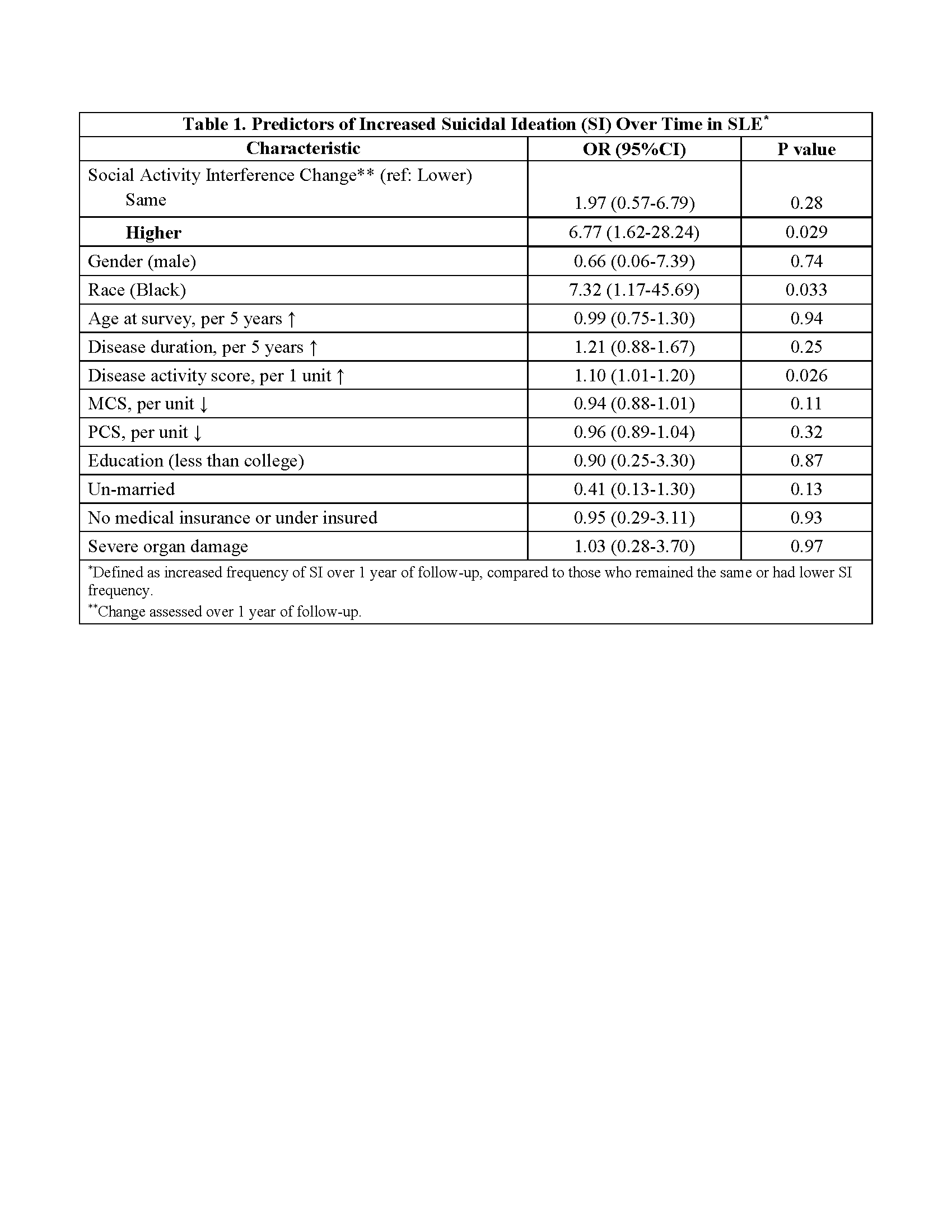Session Information
Date: Tuesday, November 15, 2016
Title: Systemic Lupus Erythematosus – Clinical Aspects and Treatment - ARHP Poster
Session Type: ACR Poster Session C
Session Time: 9:00AM-11:00AM
Background/Purpose: Social integration has been found to be a protective factor from suicide-related ideation even after adjusting for mental health predictors. This is especially salient for people with systemic lupus erythematosus (SLE) who may have a wide-range of physical and emotional problems interfering with social activities. Previous cross-sectional data suggested an association between perceived inadequacy of social support and suicidal ideation (SI). To further delve into this concept, we aimed to examine whether 1-year change of health-related interference with social activities would be associated with 1-year increase in SI.
Methods: We examined longitudinal data from the GOAL Cohort, a large population-based cohort of patients with documented SLE from metropolitan Atlanta, Georgia. Since 2011, participants respond annually to a variety of validated self-administered health outcomes. We used the social activities interference question from the SF-12 Health Survey to assess 1-year change in the amount of time physical health or emotional problems hindered social activities. One question from the Patient Health Questionnaire-9 was used to assess 1-year change in the frequency of SI (4-point Likert scale ranging from “not at all” to “nearly every day”). A multivariable logistic regression was used to examine the effect of higher interference of social activities on increased SI, after controlling for demographics and disease-related factors.
Results: Among the 715 SLE participants studied (94% women, 79% Black, 38% uninsured or underinsured; mean age 48) 98 participants endorsed SI at either baseline, Year 1 or both time points. Multivariate analysis of those 98 participants showed that the odds ratio of increased SI at Year 1 was 6.8 for participants who endorsed higher interference with social activities, compared to those who had lower interference. No significant association with increased SI was found when we compared same with lower level of interference with social activities.
Conclusion: In a population-based SLE cohort with large numbers of African American subjects there is a consistent proportion contemplating suicide in each annual survey. Findings indicate that health-related interference in social activities is a significant contributing factor of SI. This association is particularly significant when there is increasing interference with social activities, which in turn increases the risk of more frequent SI. Social activities can be a resource to enhance social integration. Further development and recognition of social support resources to which SLE patients can be referred are warranted, especially in socioeconomically disadvantaged communities.
To cite this abstract in AMA style:
Dunlop-Thomas CM, Bao G, Lim SS, Drenkard C. Health-Related Interference of Social Activities and Suicidal Ideation in Systemic Lupus Erythematosus: Georgians Organized Against Lupus Cohort [abstract]. Arthritis Rheumatol. 2016; 68 (suppl 10). https://acrabstracts.org/abstract/health-related-interference-of-social-activities-and-suicidal-ideation-in-systemic-lupus-erythematosus-georgians-organized-against-lupus-cohort/. Accessed .« Back to 2016 ACR/ARHP Annual Meeting
ACR Meeting Abstracts - https://acrabstracts.org/abstract/health-related-interference-of-social-activities-and-suicidal-ideation-in-systemic-lupus-erythematosus-georgians-organized-against-lupus-cohort/

